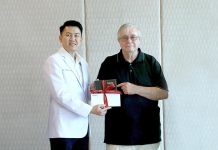There are so many “breakthroughs” every week, I am flat out reading the scientific journals. In fact there are so many researches going on that they are producing even more journals!
The latest “amazing” development is the claim that a drug made from a protein in bananas can kill a wide range of viruses – including hepatitis C, flu and AIDS.
The new wonder compound is called BanLec and it supposedly works by clinging to sugar molecules found on the surface of some of the world’s deadliest viruses.
Once the drug has locked on to the virus, it is rendered harmless – and can easily be disposed of by the body’s immune system.
The new form of BanLec, called H84T, stopped animals from getting flu. It also worked in the lab on tissue and blood samples against AIDS, hepatitis C and influenza.
The researchers believe the drug may even work on Ebola, as all of these viruses are covered in similar sugar molecules that BanLec clings to.
However, they warn that eating regular bananas will not have the same beneficial effect, as the ingredient is a modified version of the chemical found in the fruit.
The chemicals (called Lectins) have the potential to be a virus beater as they are able to bind to the sugars that are present on the surface of a range of viruses including HIV, influenza and Ebola, many of which have caused or have the potential to cause severe epidemics or even pandemics.
The key question now, the researcher stressed, was whether the drug will work in humans. Dr David Markovitz, professor of internal medicine at the University of Michigan said, “There are lots of hurdles that still need to be overcome before antiviral Lectins find their way into clinic,” he said. “For one thing, there’s a risk the immune system will recognize this as foreign and mount an immune response to it, potentially rendering it ineffective.”
Dr David Markovitz, co-author of the scientific paper, published in the journal Cell, said, ‘What we’ve done is exciting because there is potential for BanLec to develop into a broad spectrum anti-viral agent – something that is not clinically available to physicians and patients right now.”
“But even so, given recent events, generating antivirals that can work against a range of viruses is well worth pursuing.” However, several years of research still lie ahead before BanLec can be tested in humans.
Despite this, Dr Markovitz and his co-author, Dr Hashim Al-Hashimi, professor of biochemistry at Duke University, hope the team’s work can help address the lack of antiviral drugs that work well against many viruses – or against viruses that change rapidly, such as influenza.
“Tamiflu is only modestly effective, especially in critically ill patients, and influenza can develop resistance to it. But we also hope that BanLec could become useful in situations such as emergency pandemic response, and military settings, where the precise cause of an infection is unknown but a viral cause is suspected.’
“Better flu treatments are desperately needed,” said Dr Markovitz.
British researchers such as Professor Wendy Barclay, chair in influenza virology at Imperial College, London, called it ‘a new strategy for combating a wide range of viruses’ and ‘beautiful science’.
Dr Ben Neuman, a virologist at the University of Reading, said, “In this new study, the researchers changed the banana lectin just enough to stop the side effects, while keeping its virus-blocking properties intact.”
And Jonathan Ball, professor of molecular virology at the University of Nottingham, added, “Each new virus outbreak is a timely reminder of our need for antivirals that can work against a range of viruses.”
But, whilst viral infections are important, remember that according to the WHO, cancer killed around eight million people worldwide, and was the leading cause of death globally. Lung cancer was the most lethal type, and accounted for 18 percent of all cancer deaths. And finally, don’t smoke – the incidence of all cancers is greater in smokers.
Unfortunately, even though we understand more of the nature of cancer, there is no universal “cure” as yet. However, catching cancers at an early stage gives you a much better prognosis (outcome). And you can only do that if you look. Check-ups are of value.




